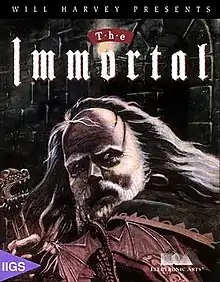The Immortal (video game)
The Immortal is an isometric action-adventure dark fantasy video game originally created for the Apple IIGS, which was ported to the Amiga, Atari ST, MS-DOS, NES, Sega Genesis and the Nintendo Switch. A wizard is attempting to find his mentor in a large and dangerous labyrinth. The game has a high degree of graphic violence. The music for Apple IIGS version was made by Douglas Fulton. On some conversions, Rob Hubbard and Michael Bartlow are credited.
| The Immortal | |
|---|---|
 Apple IIGS cover art | |
| Developer(s) | Will Harvey |
| Publisher(s) | Electronic Arts |
| Designer(s) | Will Harvey |
| Composer(s) | Douglas Fulton (GS) Rob Hubbard Michael Bartlow |
| Platform(s) | Apple IIGS, Amiga, Atari ST, MS-DOS, NES, Genesis, Switch |
| Release | IIGS: November 1990 NES: November 1990 Genesis: NA: July 11, 1991 JP: August 1993 Switch: July 15, 2020 |
| Genre(s) | Action-adventure |
| Mode(s) | Single-player |
Plot
The game begins with the player in control of an unnamed wizard. In the first room, the player is given the option of viewing the image of the character's mentor, another wizard named Mordamir. He is calling for help from deep below in the Labyrinth of Eternity, though he is attempting to communicate to another man named Dunric.
The two main types of creatures present in the labyrinth are the goblins and the trolls, who are at war with one another. This is a minor plot element in the game. Depending on the player's actions in the earlier stages of the game, it is also possible for the main character to form an alliance with the goblins.
The majority of the story is revealed through dream sequences triggered when the main character rests on straw beds placed throughout the labyrinth. It is eventually revealed that Mordamir is battling against a dragon at the Fountain of Youth. The plot of the game undergoes a twist when the main character finds Dunric having been trapped by Mordamir. In the end, the main character is inevitably confronted by both the dragon and Mordamir.
Gameplay
The game takes place on a 7- or 8-level labyrinth, depending on the version of the game. The player must solve puzzles, avoid deathtraps, use magic spells (in the form of books and scrolls), and acquire various items in order to survive the labyrinth. However, certain items will bring instant death to the player if used in an unwise and careless manner.
Combat in the game is offered in the form of a variety of non-player characters wandering or protecting a specific portion of the map. Fireball spells can be freely used to dispatch these enemies on the isometric field. However, they can not be used once the game has entered combat mode. Combat mode is initiated upon coming into close contact with these characters, and the game play shifts from the standard isometric view to a zoomed-in two-dimensional view in real-time. The real-time battle engine is limited to dodging opponent's attacks and performing sword swings and stabs.
In addition to walking, certain levels allow the main character to possess a magic carpet that flies and paddle through water while sitting on a floating barrel.[1]
Development
Will Harvey had started development on an Apple II game to be called Campaign, intending it to be an online multiplayer RPG. As the story developed, it became a single-player game only.[2]
Reception
Computer Gaming World praised The Immortal's graphics, but stated that the game was really an arcade game as it was too linear to succeed as an RPG. It also criticized the use of save points and the controls and concluded that the game "misses the target".[4] In 1992, Dragon gave the game 4 out of 5 stars.[5] Computer and Video Games magazine was positive about the graphics and control scheme and gave an overall score of 93 out of 100.[6]
Amiga Power was more mixed, awarding the game 76% and criticising its completely linear nature and lack of replay value, while identifying the graphics as a strength.[7]
References
- "The Immortal". Nintendo Power. Vol. 20. January 1991. pp. 37, 39. Retrieved 2020-01-17.
- "The Making Of: Immortal". NowGamer.com. January 19, 2009. Archived from the original on 2016-07-30.
- Bro' Buzz (December 1990). "Nintendo ProView: The Immortal" (PDF). GamePro. p. 118.
- Laurence, Will (May 1991). "Do You Want to Live Forever?". Computer Gaming World. p. 60. Retrieved 17 November 2013.
- Lesser, Hartley; Lesser, Patricia & Lesser, Kirk (February 1992). "The Role of Computers". Dragon. No. 178. pp. 57–64.
- Leadbetter, Richard (November 1990) The Immortal review – page scan at World of Spectrum, Computer and Video Games, issue 108, accessed December 14, 2012
- Winstanley, Mark (November 1993) The Immortal review – page scan at Amiga Magazine Rack, Amiga Power, issue 31, accessed December 14, 2012
External links
- The Immortal at MobyGames
- The Immortal can be played for free in the browser at the Internet Archive